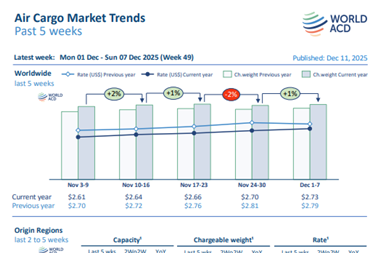The air cargo market has undergone a "fundamental shift" to e-commerce over the last few months, which has helped support increases in airfreight rates.
Writing in the monthly Baltic Exchange newsletter, Neil Wilson of airfreight rate data provider TAC Index said that rates have been increasing over the last few months because of the impact of weather conditions and geopolitical developments but also because of rising e-commerce demand.
Wilson said that strong levels of e-commerce business out of southern China have been an increasingly dominant feature of the market all year.
He pointed out that rates out of Hong Kong were holding up better than the global average.
TAC Index numbers show that in November the index of outbound routes from Hong Kong rose 19.2% and was up 0.5% year on year.
The index of outbound routes from Shanghai gained 25.4% over the month and was ahead by 7.3% year on year.
These improvements come despite general cargo demand remaining soft.
"Overall, there seems to have been a fundamental shift in the market towards e-commerce," said Wilson.
"General cargo volumes may have remained soft but that appears to have opened the door for e-commerce to access capacity that was not historically available."
On other factors, affecting the market in November, Wilson highlighted the Israel-Hamas conflict and snow storms affecting the world's third busiest cargo hub, Anchorage.
"From an air cargo market perspective, however, perhaps the most disruptive development was a prolonged period of record snowfall over several days in Anchorage, Alaska," he said.
"If severe weather in Anchorage causes any significant delays or cancellations it can have knock-on effects, especially in peak season when finding extra capacity can be more difficult.
"Arguably, those knock-on effects could be seen in the TAC Index data during the month."
Bruce Chan, director and senior research analyst covering global logistics and future mobility, at investment bank Stifel, also felt that e-commerce demand had boosted the market this year.
However, this was not necessarily an indication of a broader economic recovery.
"Strong e-commerce activity out of Asia seems to be driving a large chunk of the capacity demand," Chan said.
"Indeed, Cyber Week sales in the US climbed a robust 8% year on year. That’s generally good news for air cargo service providers, but we think it is too early to extrapolate this trend to a broader economic recovery.
"For one thing, we believe some of the cyber activity, at least in the US, was a product of attractive door-buster deals.
"Moreover, broader retail sales performance was much more muted and, net of inflation, were likely even slightly more negative year on year."
He added: "While the recovery in Baltic Exchange Index air cargo rates this month has been encouraging and we continue to see a return to normal seasonal patterns, capacity is still plentiful and will remain a headwind to rates for the foreseeable future.
"Ultimately, freight demand trends need to improve more, but for now, they remain fragile."
https://www.aircargonews.net/airlines/rates-continue-to-rise-in-november-despite-muted-demand/















